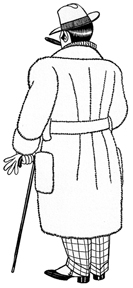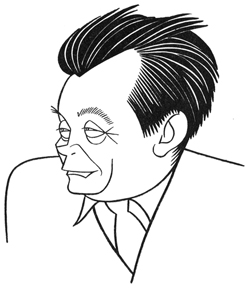In this chapter from his 1932 book, Times Square Tintypes, Broadway columnist Sidney Skolsky profiles a character he dubs The Broadwayite.
FOUR OUT OF FIVE
OUT of the mess of broken hearts, out of the string of speakeasies, out of the stage door, out of the glare of the White Lights, there has taken form a strange being. He is the soul of Broadway. He speaks its lingo. He symbolizes its credo. One little block, east or west of Broadway, and he is in another universe. Step up and shake hands with THE BROADWAYITE.
 He considers it quite an honor if Madame Guinan bounces him over the head with a bottle.
He considers it quite an honor if Madame Guinan bounces him over the head with a bottle.After a two-minute acquaintanceship with anybody he calls the party by his first name.
His philosophy of life is merely a protective covering for his shortcomings. When he dies he still will be waiting for “the breaks.”
He reads Variety from cover to cover. Can tell you where they got that inside story. Also, if it’s true. Is certain his statement is the last word in the matter.
His manners are atrocious. He always keeps his hat on. Thinks it makes him look like a newspaper man.
He is a gag carrier.
Is a sidewalk critic. Stands on the curb during intermissions and gives lectures on the entertainment. Calls all the critics by their first names. He looks familiar to them.
When dining with anyone he orders filet mignon. And can outfumble anyone for the check. When eating alone he orders beans.
Remembers George White when he was only a hoofer. Recalls vividly how George followed his advice. Knows who really picks the girls for Ziegfeld. He informs everyone that Lillian Gish and George Jean Nathan really hold hands.
He talks loudly. Even when he whispers.
He has a repertoire of stories. Uses them again and again. Even employing the same gestures. He gets to be quite boring.
He is unfeeling. His proudest moment was when a chorine jumped from the ninth floor of a hotel because he jilted her. The newspapers spoiled it all by saying she fell.
Looks for his name in Ward Morehouse‘s recording of the celebrities present. Believes the list to be incomplete if his name is not included.
He thinks that dramatic criticism in this man’s town is a matter of personal prejudice and that the Paramount Building is actually at the “crossroads of the world.”
Had a sandwich named after him in a well-known delicatessen.
If given his choice to be anyone in all history he would select himself.
He has never been in the Metropolitan Opera House. Tried to crash it once. It was the Lambs’ Gambol. He couldn’t get by a ticket taker. He went in like a Lamb and came out like a lion.
Nothing has ever been known to embarrass him.
Will often reprimand a waiter in this manner: “How about a little service? Do you know who I am? I’m practically God.”
Let him cough once. Then he believes that the night life has got him at last. That he has tuberculosis. A lozenge clears the throat and he is off again.
His ambition in life is to have his nameplate on a seat in the Chanin theaters.
He has written for almost every magazine in America. Has the rejection slips to prove it.
His favorite expression is “I told you so.”
He is greatly admired by folks who don’t know him.
It is utterly impossible for him to keep a secret.

